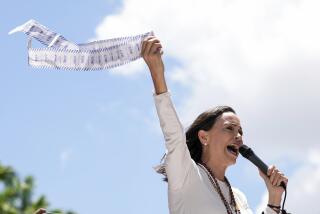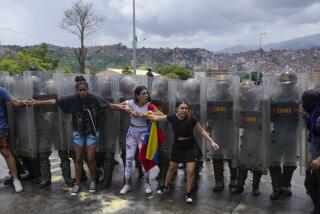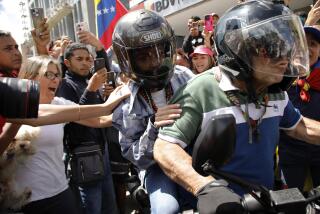Protests mount in Honduras after military coup
TEGUCIGALPA, HONDURAS, AND MEXICO CITY â Honduran security forces Monday fired tear gas at angry protesters demanding the return of deposed President Manuel Zelaya, as leaders of the Western Hemisphere pressed for an end to Central Americaâs first military coup in 16 years.
Troops in battle dress chased rock-throwing demonstrators through the downtown streets of Tegucigalpa, the capital, as a military helicopter whirred overhead. At least 30 people were injured, a Red Cross official said. One man reportedly died after being hit by a truck in an earlier incident.
Honduras found itself increasingly isolated a day after the army arrested Zelaya and deported him to Costa Rica. President Obama said allowing the coup to stand would set a âterrible precedentâ that evokes âa dark past,â and several Latin countries with leftist governments recalled their ambassadors from Tegucigalpa.
Hondurasâ de facto rulers also imposed a media blackout, preventing international newspapers from circulating and blocking access to Internet news sites and international cable television news networks.
Zelaya, a leftist whose efforts to change the constitution fueled opposition to his rule, appeared at a summit of regional heads of state in Managua, Nicaragua, and was invited to speak at the United Nations General Assembly today.
âI want to return to my country,â Zelaya said. âI am president of Honduras.â
Zelaya said he would accept an offer by Organization of American States Secretary-General Jose Miguel Insulza to return to Honduras and would like to make the trip Thursday.
Despite nearly unanimous international condemnation of the coup, the man whom the Honduran Congress named to replace Zelaya remained defiant.
Roberto Micheletti said the Honduran Supreme Court backed the removal of Zelaya, whom it accused of violating the constitution. Micheletti said Zelaya had used his close ties to Venezuelaâs President Hugo Chavez to drag Honduras to the radical left.
âEighty to 90% of the Honduran population is happy with what happened,â Micheletti told Honduran radio.
Honduras is, in fact, divided. Zelaya has a strong following among the Honduran poor, but he alienated Congress, the Supreme Court and much of institutional Honduras.
In the streets of Tegucigalpa, protests were growing. Several thousand Hondurans, including youths, teachers and workers, converged near the presidential palace early Monday, vowing to occupy the zone until Zelaya returned.
Chanting support for the president known by his nickname, Mel, protesters burned tires and set up makeshift barricades using bricks, stones and metal signs. Some were armed with sticks and clubs and taunted the soldiers. Smoke billowed and traffic snarled badly on blocked streets.
âThis is only the beginning,â said demonstrator Felix Murillo Lopez, 37, a high school teacher. âFor sure, itâs going to get bloody.â
By afternoon, troops began cracking down. They fired M-16 rifles into the air and tear gas at groups of demonstrators, some of whom hurled stones and broke windows. Most of the violence took place in an area a couple of blocks from the presidential palace, full of small restaurants like McDonaldâs and Burger King.
âThe soldiers beat us like dogs,â declared Yamie Viera, 30.
Anata Margarita Medina, a teacher, wept as she recalled how soldiers beat her with a rifle butt.
âThen they dragged me and threw me down some stairs and insulted me and accused me of throwing rocks,â she said. âI told them I hadnât, but they kept beating me on the back with their rifles.â
The injured included people overcome by tear gas and some with bloodied heads, said Luis Reyes of the International Committee of the Red Cross as he bandaged one bleeding young man. He said 30 people were treated at his station alone.
Bertha Oliva, a human rights activist in Honduras, said her group had reports of 60 people treated at a hospital.
âThese people causing this violence are digging their own tomb,â Oliva said.
At one point, soldiers rushed into the lobby of the Marriott Hotel, about 100 yards from the presidential palace, to yank away a group of demonstrators whoâd sought refuge inside.
Earlier, workers at the telephone company were protesting the installationâs takeover by about 50 troops. One man was badly injured after being hit by a truck driven by soldiers and later died, his colleagues said. The incident could not be independently verified. The workers said they wanted to prevent soldiers from making off with the telecommunications equipment.
Before the violence around the presidential palace, demonstrators said they might not have agreed with all of Zelayaâs policies, but that using the army to remove him was incorrect.
âThe president told the oligarchs that they were a bunch of corrupt people who werenât democrats and who oppressed the people and who didnât share their wealth,â said Dalila Aparicio Colindres, a 53-year-old teacher protesting in favor of Zelaya along with her 20-year-old son. âThey didnât like it, and it made him their enemy.â
âIâm here in the street to support democracy,â said another demonstrator, Medardo Cardona Landa, an artist who teaches at the Fine Arts School.
Micheletti and the other people running Honduras argue that the removal of Zelaya -- and the installation of Micheletti -- was legal because Congress and the courts signed off on it.
After weeks of tension, the standoff between Zelaya and his many opponents came to a head over a vote heâd scheduled for Sunday that asked Hondurans whether theyâd be interested in revising the constitution. The Supreme Court, attorney generalâs office and military opposed holding the vote, deemed illegal because it was not endorsed by the electoral tribunal. Many feared Zelaya was using the bid to extend his own time in office, as other Latin American leaders have done. As it stands, the Honduran Constitution limits presidents to a four-year term.
Ramon Custodio, the national human rights commissioner, said the military action could not be called a coup.
âWe are returning to constitutional order,â he told journalists in Tegucigalpa. âIt was impossible to continue with such an authoritarian person.â
In Washington, the Obama administration repeated its condemnation of the coup, despite ambivalence about Zelaya.
âOur immediate priority is to restore full democratic and constitutional order in that country,â Secretary of State Hillary Rodham Clinton said. She urged dialogue.
Obama said Zelayaâs ouster was ânot legalâ and he remained the recognized president of Honduras.
Countries with governments from left to right denounced the events in Honduras, from Venezuelaâs Chavez, who pledged to help Honduras âresist,â to conservatives such as Mexicoâs President Felipe Calderon.
The Organization of American States scheduled a meeting of foreign ministers today to debate whether Honduras should be suspended under rules that disqualify non-democratic regimes.
--
Renderos is a special correspondent.
More to Read
Sign up for Essential California
The most important California stories and recommendations in your inbox every morning.
You may occasionally receive promotional content from the Los Angeles Times.











